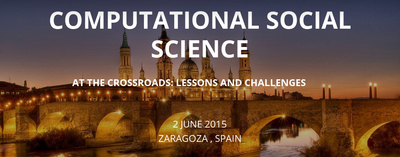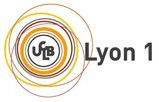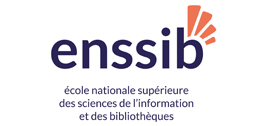Computational Social Science
Computational Social Science - At the crossroads: lessons and challenges
| Quand ? |
Le 02/06/2015, de 09:00 à 17:00 |
|---|---|
| Où ? | Zaragoza , Spain |
| Ajouter un événement au calendrier |
|
 The interest of physicists in economic and social questions is not new: for over four decades, we have witnessed the emergence of social simulation, a fast expanding research field inside the wider domain of Interdisciplinary Physics. With tools borrowed from Network Science and Complexity, this new area of study have already made important contributions, which in turn have fostered the development of novel theoretical foundations in Social Science and Economics, via mathematical approaches, agent-based modelling and numerical simulations.
The interest of physicists in economic and social questions is not new: for over four decades, we have witnessed the emergence of social simulation, a fast expanding research field inside the wider domain of Interdisciplinary Physics. With tools borrowed from Network Science and Complexity, this new area of study have already made important contributions, which in turn have fostered the development of novel theoretical foundations in Social Science and Economics, via mathematical approaches, agent-based modelling and numerical simulations.At the turn of the century, however, it was clear that huge challenges –and new opportunities– lied ahead: the digital communication technologies, and their associated data deluge, began to nurture those models with empirical significance. Only a decade later, the advent of the Web 2.0, the Internet of Things and a general adoption of mobile technologies have convinced researchers that theories can be mapped to real scenarios and put into empirical test, closing in this way the experiment-theory cycle in the best tradition of Physics.
We are nowadays at a crossroads, at which different approaches converge. We name such crossroads Computational Social Science (CSS): a new discipline that can offer abstracted (simplified, idealized) models and methods (mainly from Statistical Physics and Network Science), large storage, algorithms and computational power (Computer and Data Science), and a conceptual framework for the results to be interpreted (Social Science).
This Satellite event aims to grasp how CSS spreads out in many interwoven fronts, each of which is a challenge per se. We are thus interested in any of the following topics:
- Social simulation: cultural, opinion, and normative dynamics
- Social influence, public attention and popularity dynamics
- Structure and dynamics of multiplexed social systems
- Interdependent social contagion process: models and mechanisms
- Online communication: Temporal and geographical patterns of information diffusion
- Online socio-political mobilisations, collective action, social movements.
- Event modelling, tracking and forecasting in social media
- Peer-production and collaborative knowledge creation
- Crowd-sourcing; herding behaviour vs. wisdom of crowds
- E-democracy and online government-citizen interaction
- User-information interplay: information ecosystems
- Group formation, community detection and dynamic community structure analysis.
- Empirical calibration and validation of agent-based social models
- Science of science and scientometric modelling
- Online experiments and data-driven models of social phenomena










